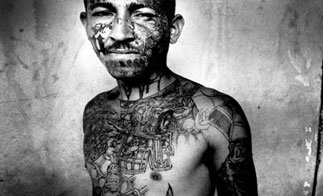According to an unnamed “investigator” consulted by Guatemala’s most-circulated newspaper, the country’s two largest street gangs, the Mara Salvatrucha (MS-13) and Barrio 18 have evolved distinctly different tactics, ranging from dress to criminal activities.
The MS-13 prefers a more clandestine approach than the Barrio 18, the unnamed source told Prensa Libre. Group members wear fashionable, even formal clothing, making them difficult to identify. This allows them to “infiltrate” upscale businesses and later extort them, the source claimed.
MS-13 members also reportedly prefer to legally register their vehicles and arms, although they sometimes use the names of homeless people in the official registry. The group reports many of its weapons as stolen, so that if any are confiscated or traced back to a specific crime, the weapon is registered as missing rather being attached to anyone’s name.
The MS-13 have also been known to hire lawyers. One was recently sentenced to 16 years in prison, following her 2011 arrest, for recruiting young hitmen into the gang.
The Barrio 18, on the other hand, operates more like a stereotypical street gang, Prensa Libre reports. Its members can be “identified immediately by their behavior and the foul language they use,” the unnamed source told the newspaper. And in contrast to the MS-13, Barrio 18 members used stolen cars and weapons in their operations.
There are still some key similarities between the two groups. Prensa Libre’s source emphasized that both gangs primarily victimize bus companies and their employees.
InSight Crime Analysis
While a single anonymous source is far from an authority on the matter, the Prensa Libre report still contains some interesting suggestions of the MS-13’s evolving modus operandi.·If the group is indeed emphasizing using more clandestine tactics — which means formally registering their cars and weapons rather than using stolen items, and avoiding much of the outward gear (including clothing and tattoos) associated with gang life — this could suggest that the group has evolved somewhat in reaction to Guatemala’s “Iron Fist” crackdown against gangs.
Laws criminalizing association with gangs in Guatemala meant that some citizens would face legal scrutiny because of their speech, dress code, or haircuts. This nationwide crackdown appears to have some effect in pushing the MS-13 to operate more discretely, as the report says.
That being said, the source consulted by Prensa Libre makes some problematic generalizations, including asserting that Barrio 18 members may be identified merely by their “behavior” and “language.” This approach to Guatemala’s gang problem is misguided, as it helps feed the assumption that gang members should be presumed guilty of committing actual crimes, simply by the most superficial and stereotypical associations.
Evidence of this shift towards more “undercover” MS-13 operations is also reportedly evident in Honduras, another country to adopt an “Iron Fist” stance towards gangs. According to a June report released by the Honduran government’s gang reinsertion program, street gangs in that country are trying to adapt a more clandestine approach, which includes recruiting fewer people and avoiding aggressive confrontations with the law.

